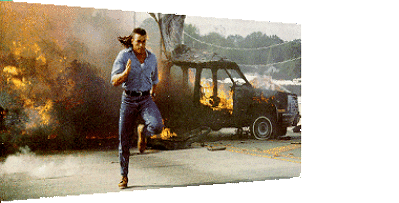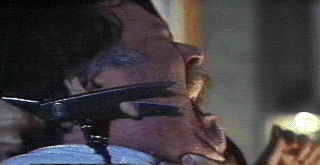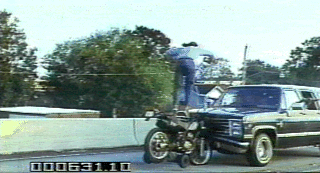

Without a doubt, the most outrageous cutting catastrophe that has occurred over the last couple of
years has been John Woo’s Hard Target. Sure, when it was first announced that Woo would be
bringing his two fisted style of action to the US, fans weren’t too optimistic and few believed his style
would survive the East to West transition. So, was it really that bad? Well, yes!
To put it lightly, it was as if both Universal and the M.P.A.A. repeatedly took turns kicking Woo in
the balls, all the while politely saying, "Welcome to the good old U S of A!" By the time all the smoke
had cleared, it seemed everyone associated with the film had made their own personal cut (just
imagine what Van Damme's Butt Cut looked like. YIKES!). The only ones who really suffered where
audiences, who were forced to watch a atrociously edited 94 minute print in August of 1993.
Thankfully, a director's cut did surface. The film runs twenty-two minutes longer (bringing it up to 116
minutes), with a majority of that time being composed of nonstop bloodshed. Suffice to say that the
director's cut and the R rated cut are as different as night and day and that the extra minutes make
one hell of a difference. To describe each and every cut would literally fill volumes (and Tom ain't
shelling out that much), so listed below are brief summaries of all the major action scenes as they
appear in the director's cut. Just remember, all numbers are general, so don't bitch if I miss a bullet or
two.
The differences begin as soon as the film commence. The opening "hunt" of Charles Binder (played
by the film's screenwriter, Chuck Pfarrer) is substantially longer and increasingly cold blooded. After
freeing himself from the first arrow that pinned him to a tree, Binder is shown pulling the shaft out of
his shoulder in agonizing slow motion. Binder then takes several rounds of machine gun fire in the gut.
That is not to say that Binder is a complete softy (as he was portrayed in the theatrical print). After
all, the guy is a Vietnam vet. With the help of a half empty gasoline can (a reoccurring theme
throughout the film), Binder manages to take out at least one leather clad biker.
We now turn our attention to the little shack on the waterfront. In the R rated cut, it is just blown up.
Well, in this version, Binder just happens to be inside the thing, looking for safety, as it explodes.
Reeling from the blast, Binder gets up and heads toward the waterfront. This nights hunter, Mr.
Lopacki (Bob Apisa), fires several arrows at Binder. While on the dock, Binder receives a extra
arrow in the ass, which sends him crashing through a chain-link fence. This extra arrow can clearly be
seen in the R rated cut when Binder falls through the dock, prompting one to scratch their head and
wonder how it got there. Unfortunately, in both versions, Binder sees his final moments in the films
first few. An extra bit of dialogue occurs as Binder's body is pulled from the water. Fouchon's (Lance
Henricksen) right hand man, Van Cleaf (Arnold Vosloo), tells Mr. Lopacki that he shoots like a
buffoon and that next time, he would be charged double.
The next major action scene is the fight that takes place outside the cafe. This scene really serves no
purpose, other than to introduce the character of Chance Boudreaux (Jean Claude Van Damme) to
our heroine Natasha Binder (Yancy Butler) and for Van Damme to show off a bit. Surprisingly, this
scene made it completely intact. The logic then being: You can kick, punch and pummel the human
body all you want, but once you start blowing holes in 'em, you must be stopped.

We now move on to the infamous ear scene. It was pretty obvious (even to the most naive viewer)
that Woo’s Reservoir Dogs homage was severely cut. After being scolded by Fouchon (Lance
Henricksen), the sleazy Randall Poe (Eliott Keener) has the lobe of his right ear cut off by Van Cleaf.
As Van Cleaf diligently cuts away, blood streams down Poe's sweatshirt. After the fleshy stub is cut
off, Fouchon delivers a punch to Poe that sends blood flying across the room. Poe then admits he has
learned his lesson and business resumes as usual, as Poe begins looking for new game.
The hunting of Elijah Roper (Willie Carpenter) is another case of what you see is not necessarily what
you were supposed to get. After striking the deal in the railyard, the chase quickly relocates to a
cemetery, where Elijah easily appropriates Mr. Zahnan's gun. Not being one to risk anything, Elijah
fires at least six extra bullets into his stalker. Curiously missing in the director's cut is a shot of
Fouchon, having just killed Mr. Zahnan, throwing the bullet casing into a mausoleum. I guess Woo
knew his criminals weren't stupid. The chase then heads onto the neon lit streets of New Orleans.
After Elijah unsuccessfully tries to elicit help from bystanders (including a jittery Ted Raimi), he
decides to face his attackers. Big mistake, seeing as they shoot him at least 15 times. Proving once
again that Vietnam vets are no easy kill, Elijah rises to his feet, faces his attackers once again, and
then is shot down in another hail of bullets (another minimum of 15, here).
After finding out about Elijah's death (and struggling to do some of that acting stuff), Chance, along
with Natasha and rookie female cop Carmine (Kasi Lemmons), decide to pay Randall Poe a visit.
Unfortunately for them, Poe is already preoccupied in a meeting with Van Cleaf and his trusty
shotgun. By the time Van Damme and company arrive, Poe is doing his best Bud Dwyer
impersonation, when they are suddenly attacked by Van Cleaf and his cronies. The first to go is
Carmine. She takes a couple of more hits of machine gun fire and there is a cool shot of blood
splattering out her back. Using both Poe's car and the police cruiser as cover, Van Damme grabs
Carmine' s gun and decides to take on the badguys (at least that is what his facial expression
suggests). Taking a flying leap onto the hood of the cruiser, he manages to get a few more rounds into
the 4X4 (especially the driver) that is speeding by. Van Damme then takes on a biker who was
nowhere to be seen in the theatrical cut. As the bike speeds towards he two cars, Chance fires
several shots, causing both blood and sparks to fly. The biker loses control of his vehicle and slams
right underneath the cars. Chance then thumps the other biker in the helmet with his foot (which,
come on folks, is pretty absurd) and grabs one of the bikes (the second bike can be seen in the R
rated cut, hmmmmm, how'd that get there?). He delivers his macho line and then, with Natasha in
tow, heads off into the seemingly deserted streets of New Orleans.
If you were quick enough to catch it, you'll notice they are chased by a 4X4, a biker and a four door
sedan. So, what ever happened to that sedan? Well, it definitely shows up in the director' s cut.
Before taking out yet another biker (the "grab the bar" scene), Chance plays a little game of chicken
with the mystery sedan. Firing several rounds into the windshield, Van Damme causes the driver to
swerve, sending the car into a parked car. As with all action films, the parked car serves as a ramp to
send the other one into the air. The sedan tumbles a couple of times and then explodes (naturally).
Chance then disposes of the aforementioned biker. Interestingly, a shot of sparks flying off the bikes
body is missing in the R rated cut. I guess "sparks" fall right under bloodletting on the M.P.A.A.'s list
of no-nos.
Still being chased by the 4X4, Van Damme heads onto a highway ramp that is under construction.
Gearing up for his second game of chicken, Van Damme drops off Natasha and then zooms straight
towards the 4X4. He does manage to get off a few extra shots before the bike slams into the 4X4,
creating the films best stunt. (This scene actually got cries of "Yeah right!" and "Bullshit!" from the
audience who probably found the "dynamics" of True Lies captivating). Kudos go out to that brave
stuntman. Alas, the scene is not perfect. If you slow it down on your VCR, just before the motorcycle
and 4X4 collide, you can clearly see a set of training wheels on the bike. Anyway, for all that
destruction, Fouchon's men still fail to kill the duo of Boudreaux and Binder, which takes the chase
into the bayu.

Van Damme and Butler make their way through the treacherous Louisiana bayu, setting up a
ingenious snake trap (although the obligatory jungle spike-trap would have been better) and finally
reach Uncle Douvee's (Wilford Brimley) humble abode. Unfortunately for the viewer, here is an extra
scene that should have been left on the cutting room floor. Upon being reunited Douvee and Chance
begin to hop around singing "Alouette". A shot of Louisiana culture or male bonding at it's worst?
Neither. The scene is quite embarrassing, and after watching Van Damme sing, I'd rather watch him
“act.” Gratefully, Fouchon and his men show up and put a fiery end to this Hee Haw hoedown, with
Chance and Uncle Douvee heading in opposite directions.
The villains, naturally, follow Chance, who leads them to the Mardi Gras graveyard. It is here that the
film really lets loose, giving us a nonstop barrage of death and destruction.
(Note: If a villain doesn't have a name, then he is referred to by the clothes he is wearing)
After taking out a couple of bikers (including one with a gas can), Van Damme decides it is time to
take on the big boys. First to go is the Hawaian Shirt guy. Van Damme sees his reflection in a bikers
helmet (so that's why they wear those things), turns around and then fires a minimum of 30 shots (try
counting it yourself, it's great fun at parties) into the guy before kicking him in the (helmet-clad) head.
As for that biker mentioned earlier, Van Damme spins around and fires a couple of shots into him,
while intoning, “give it a rest, pal.” Just to keep Van Damme on his toes, Woo has another biker
(how many of these guys are there?) pop up from behind a float. Van Damme actually reloads and
then takes care of the guy. We have now entered video game territory.
Meanwhile, Woo has Douvee and Natasha come into the scene, thinking they can help good ol’
Chance out in one piece. In a scene very reminiscent of Woo’s own Hard Boiled, Natasha takes out
a thug who makes the fatal mistake of calling her a "bitch". Here she puts at least 6 rounds into the
guy's gut.
At the same time, Van Damme is continuing his one man rampage. In a shot nowhere to be seen in
the R rated cut, Jean Claude just grabs a random bad guy and fires into him three times. Van Dame
then takes to the air (courtesy of a well place rope) and takes on the Cowboy guy. There is a great
shot where the camera is behind the Cowboy and we are treated to juicy squibs blowing out his
back.
Next up is Mr. Lopacki. The punishment is laid on thick as Lopacki in shot 4 times, kicked in the
head (check out his lips) and then shot 5 more times (not to mention the arrow that Uncle Douvee
shot into his arm). Chance reloads for a record second time and then turns his attention to the
Camoflage man. While taking cover at the bottom of a set of stairs, Chance takes out yet another
biker (yawn!) and then shoots the Camoflage man once in the leg. (Camoflage man can actually be
seen falling at the top of the stairs in the R rated cut, but the scene of him getting shot is not there).
Chance and Van Cleaf (as I confusing you yet?) then have their wall to wall showdown/chat, as both
men run though the warehouse, rapidly shooting at each other, Chance turns his attention to the
rooms behind him. He takes out Biker 1289 and then begins to fire several times (minimum of 17)
into Camoflage man. Blood and glass spray, in what is perhaps the films juiciest killing. Deciding his
work in still not complete, Van Danne kicks another nameless thug in the throat and then fires into his
chest at least 8 times.
Van Dame then decides to get rid of Van Cleaf. A Woo staple appears here, as Van Damme,
propelled by the blast of a grenade, slides across the floor, a gun in each hand, blasting Van Cleaf
with a minimum of 25 slugs.
Now, it is time for the final showdown involving Fouchon and Boudreaux. This scene is quite
different. Missing from the release print are some great bits of dialogue by Henricksen (personal
favorite: “There isn't a country in the world that I haven't fired a bullet in.”). However, missing from
the director's cut is the rock ‘em sock lem kickboxing ending where Van Damme tells Henricksen
that, “Hunting season is over!” Word has it that f ans wanted to see Jean Claude literally kick some
more ass (heads actually), so they went back and reshot that ending. Also gone is the crowd pleasing
"Whoops" by Henricksen as he tries to disarm a grenade. Instead we have a still satisfying "Aw Fuck"
look from the man.
Surprisingly, the action scenes weren't the only bits cut. Also missing is a "love" scene between Van
Damme and Butler. The scene takes place right after Natasha finds out about her fathers death.
Chance takes her back to his bachelor pad, where Natasha tends to his wounds and he tells her the
sob story of his life (i.e. never met my parents, grew up with Uncle Douvee etc). The lights then shut
off (smooth move, Jean Claude) and, in typical fashion, the candles are lit. Chance then tries to put
the moves on by kissing Natasha. Looking somewhat upset, Natasha leaves, only to return a few
seconds later. "I changed my mind", she says. "It happens", replies Chance with a wanton look in his
eye. The scene is actually quite good and actually gives Chance some character depth for once.
Rumor has it that it was cut because test audiences were upset that no flesh (Butler's breasts and Van
Damme's ass) was shown.
The hunters are also played out with a little more professionalism in Woo’s cut. In the R rated cut,
they just bombard Uncle Douvee's house, whereas here, they surround it and slowly move in, like a
lion hunting its prey. Van Cleaf‘s tracking abilities are also exploited better. In one scene as the
hunters search a railroad bridge, Woo shows a barren marsh and then slowly fades in the images of
Van Damme and Butler running. This basically shows that Van Cleaf is on the same wavelength and
can sense their every move. It is a great effect, but was probably cut because it confused the preview
audience. In one quick snippet of dialogue, Fouchon claims to have men "along Route 90" just in case
they head for the highway. These men are quite serious about their game.
No scene proves that more than when Fouchon is playing the piano. Intercut with this scene is
extremely graphic stock safari-footage of animals being hunted and killed, proving the hunters really
do think of the men as just game. Just to let you know, there are a couple of other versions floating
around. one is a very poor quality rough cut that runs around 126 minutes. There is also a letterboxed
Japanese print that is supposedly uncut in terms of violence, though I have yet to see it. To please all
the fanatics, it should be said that the timecoded print is the final version that Woo turned in.
A majority of Woo’s style (low camera angles, slo-mo, freeze frame) was also diluted, giving the
audience a watered down Woo. Gone is the complete "feel" of the film. It was basically stripped to
the bare bones and released as a Jean Claude Van Damme picture, not a John Woo picture. Too
bad, because after viewing the director's cut of the film, it is apparent that Target is a worthy film in
Woo's filmography, fitting in nicely right behind Hard-Boiled.
| Main Page | Quentin Tarantino | Martin Scorsese | John Woo | Robert Rodriguez |